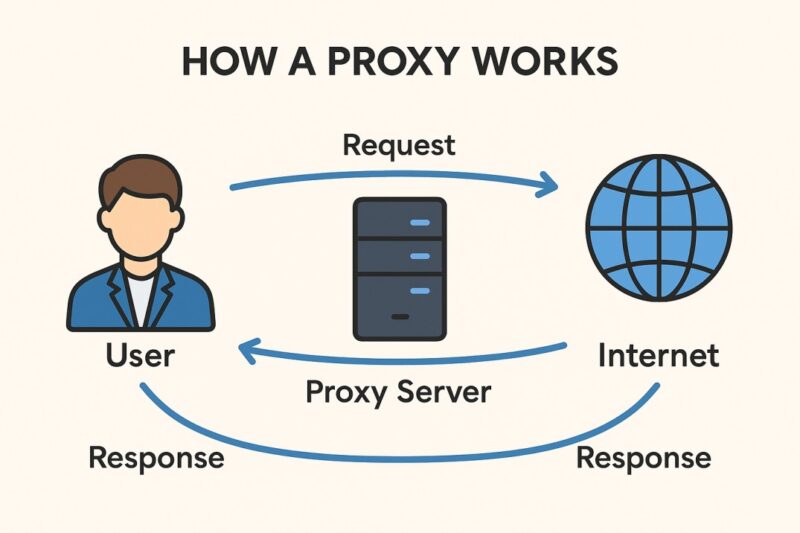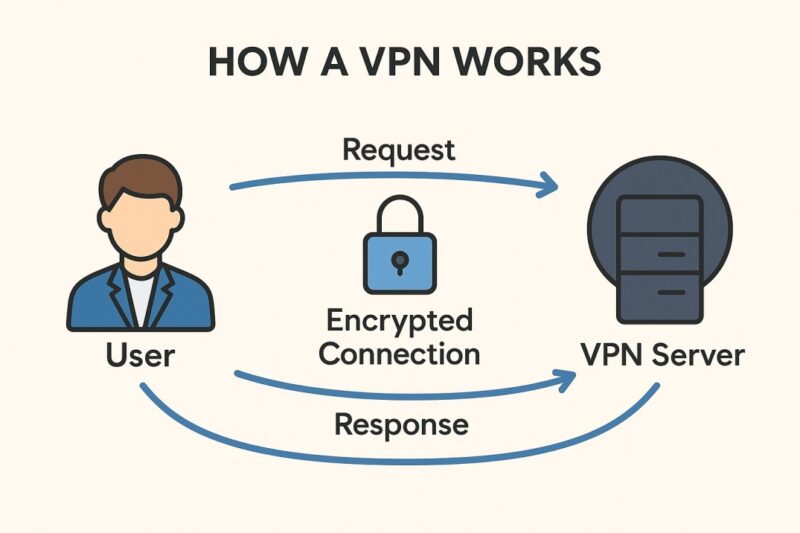Most of us browse the internet without giving a second thought to our privacy. Yet, every action and search reveals pieces of our identity and our location. If you’ve considered how to mask your location, gather data from various regions, or stay anonymous on public Wi-Fi networks, you likely know about proxies and VPNs. While these terms are frequently mentioned together, they serve different purposes. So, which one actually protects your privacy? And when should you use each? Let’s reveal the differences between Proxy Server vs VPN to determine which better safeguards your online privacy and enhances security.
Table of Contents
What Is a Proxy?
Think of a proxy like a tailored mask for your browser or app. It sits between your device and the internet and makes requests under its IP, not yours. That’s why websites and services think you’re browsing from a different place.
Proxies come in three main types:
- Transparent: Doesn’t help with privacy—everyone still sees your actual IP address.
- Anonymous: Hides your IP address, but identifies itself as a proxy.
- Elite: Hides everything—IP and proxy identity.
Marketing teams love them for testing local search results or scraping data. They’re fast, cheap, and flexible. But here’s the catch: proxies don’t encrypt your connection. Use one over public Wi‑Fi, and anyone sniffing network traffic can still see what you’re doing. To be sure of what kind of proxy you’re using, you can run it through a proxy checker tool. These tools help confirm if your IP is exposed, if the proxy is leaking, or whether it’s truly anonymous

What Makes a VPN Different?
A VPN is like a secure pipe through which all your internet traffic runs. It hides your IP, encrypts data end-to-end, and makes it look like you’re elsewhere. Whether it’s banking, work, or an app connection, everything is protected—not just browser traffic.
And because VPNs encrypt your data, they stop ISPs, hackers, or Wi‑Fi snoops in their tracks. That’s why, according to TechRadar, 79% of VPN users say privacy—not streaming—is what they’re after. If you’re ever on open Wi‑Fi, a VPN isn’t just nice—it’s essential.

Proxy or VPN?
| Feature | Proxy | VPN |
|---|---|---|
| IP Hiding | Yes | Yes |
| Encryption | No | Yes (full-device TLS tunnel) |
| Scope | One app or browser | Whole system |
| Speed | Fast (lightweight) | Slightly slower due to encryption |
| Best For | SEO tools, data scraping, bots | Privacy, public Wi-Fi, geo-unlocking apps |
Essentially, a proxy hides your IP address for specific apps or browsers, but it doesn’t encrypt your data. A VPN hides your IP and encrypts all your internet traffic across your entire device. The proxy is lighter and faster; the VPN is more secure.
Let’s unpack what this means for your daily use.
1. When You Should Use a Proxy
For SEO, Scraping, and Region Testing
If you’re running a tool to track keyword ranks in London, Tokyo, or Toronto, proxies are your best friend. They allow you to request pages from different IP addresses in those exact regions. And unlike VPNs, you can automatically rotate IPs, making scraping safer and smoother. That’s why the global proxy market is projected to reach nearly USD 5.4 billion by 2033, growing at approximately 9% per year—this is big business for a reason.
Proxies are lightweight; they’re built for fast, repetitive tasks. No encryption overhead means you can process requests quickly, making it perfect for high-volume automation.
2. When You Should Use a VPN
For Privacy and Security
If you ever use public Wi‑Fi, a VPN is non-negotiable. A recent report shows that even in 2025, about 54% of Americans don’t realize they need VPNs—surprisingly low for today’s environment. VPNs don’t just change your IP; they secure the whole connection.
For Accessing Region-Locked Features
Ever downloaded CapCut only to find your region blocks specific filters or templates? A VPN for CapCut fixes that—switch your virtual location to somewhere the app supports, and voila: full access. Many creators utilize this approach to access the latest social media tools without restrictions.
3. When to Use Both
If you’re in digital marketing, automation, or cybersecurity, you’ll often want a VPN and proxies. Use the VPN to encrypt all your activities, then run specific tools—such as rank trackers or scrapers—through proxies. That layered approach keeps your identity hidden and your automation under the radar.
4. Real Risks You Should Know About
A study on free proxies (over 640,600 tested) found that only around 34.5% were active, and many had security vulnerabilities or modified content in transit. Relying on them is a gamble—and usually the wrong kind.
Around 8% of users still don’t trust VPNs for security, and another 9% question their privacy guarantees. Add to that DNS leaks, shoddy logging practices, and poor server quality, and you’ll see why it’s essential to choose a vetted provider.
5. What to Watch
- Go for no-log VPNs backed by actual audits.
- For proxies, choose residential or rotating IPs—they are more effective at avoiding blocks than cheap data-center ones.
- Steer clear of anything free or unknown—it’s too risky.
- Keep your software updated, use leak protection, and clear cookies regularly. These details separate the pros from the amateurs.
A VPN shields you from cybercriminals, prying eyes, and even your internet service provider by encrypting all your online activities, making it particularly beneficial when using public Wi-Fi. Conversely, a proxy merely conceals your IP address while leaving your data vulnerable, indicating it’s not dependable for complete security. When handling sensitive data, relying solely on proxies is inadequate.
Final Take
Proxies and VPNs aren’t interchangeable tools. They solve different problems.
Suppose you’re trying to stay anonymous while running dozens of location-based SEO checks, pulling data from multiple sources, or testing how content appears across regions. In that case, proxies give you the flexibility and speed to do that. They’re built for scale and automation, not encryption.
If you’re more concerned with privacy, especially on networks you don’t trust, then a VPN is a better choice. It doesn’t just hide your IP — it locks down your entire connection. It’s not flashy, but it works.
And if you’re doing both kinds of work — say, you’re a digital marketer juggling research, content testing, and client credentials — then the answer isn’t either/or. It’s both. Use a VPN as your baseline security, and layer proxies on top where you need targeted access or volume.

Andrej Fedek is the creator and the one-person owner of two blogs: InterCool Studio and CareersMomentum. As an experienced marketer, he is driven by turning leads into customers with White Hat SEO techniques. Besides being a boss, he is a real team player with a great sense of equality.
